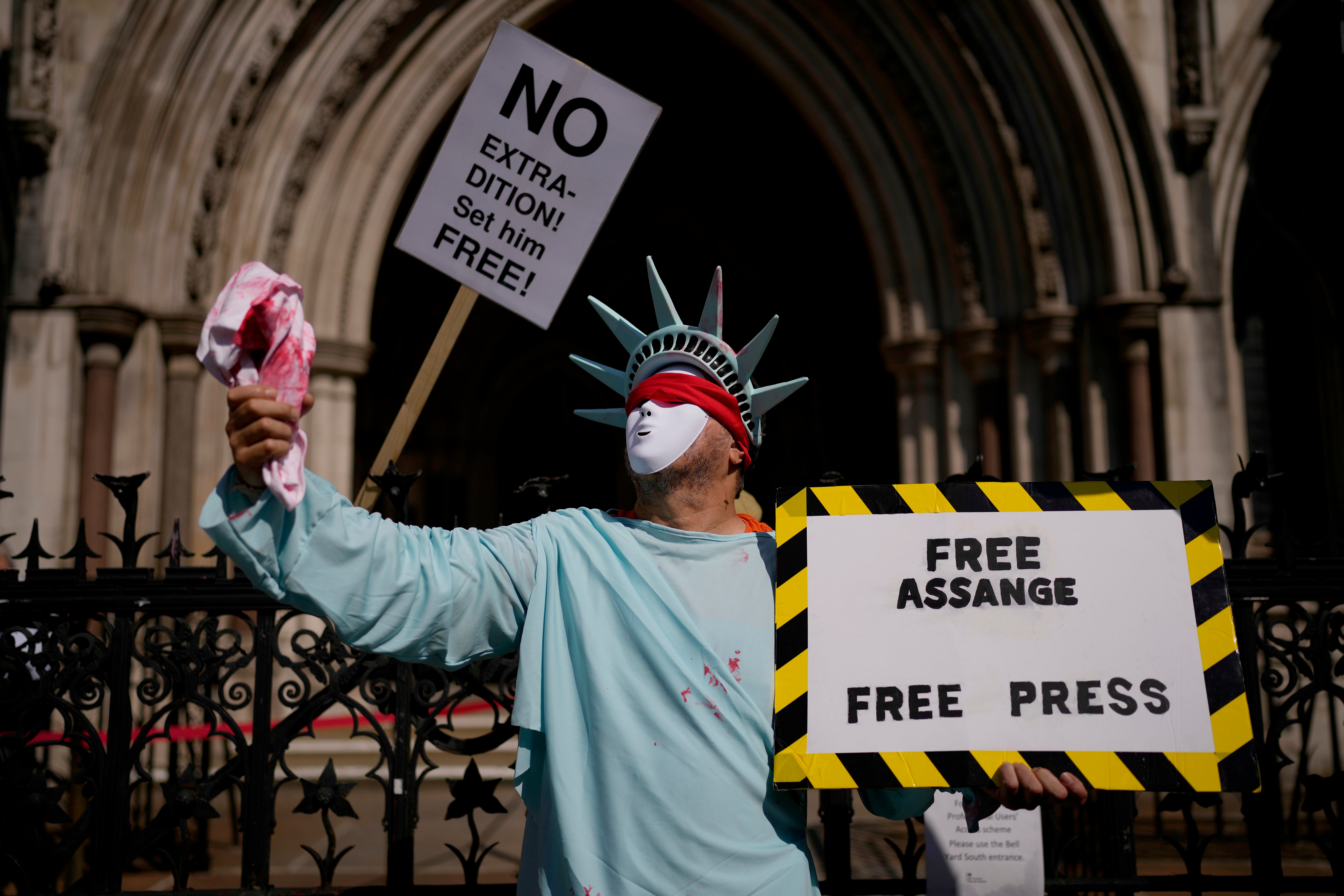US lawyers appeal UK decision to block Assange extradition
Lawyers acting on behalf of the U.S. government have challenged a British judge’s decision to block the extradition of WikiLeaks founder Julian Assange to face espionage charges in the United States

Your support helps us to tell the story
From reproductive rights to climate change to Big Tech, The Independent is on the ground when the story is developing. Whether it's investigating the financials of Elon Musk's pro-Trump PAC or producing our latest documentary, 'The A Word', which shines a light on the American women fighting for reproductive rights, we know how important it is to parse out the facts from the messaging.
At such a critical moment in US history, we need reporters on the ground. Your donation allows us to keep sending journalists to speak to both sides of the story.
The Independent is trusted by Americans across the entire political spectrum. And unlike many other quality news outlets, we choose not to lock Americans out of our reporting and analysis with paywalls. We believe quality journalism should be available to everyone, paid for by those who can afford it.
Your support makes all the difference.Lawyers acting on behalf of the U.S. government on Wednesday challenged a British judge’s decision to block the extradition of WikiLeaks founder Julian Assange to face espionage charges in the United States, arguing that assessments of Assange’s mental health should be reviewed.
The British judge ruled in January that Assange was likely to kill himself if held under harsh U.S. prison conditions. The U.S. government is appealing.
Clair Dobbin, a British lawyer who represented U.S. authorities during a High Court preliminary hearing on Wednesday, said that District Judge Vanessa Baraitser based her decision not to extradite Assange on a “predicted risk of suicide” rather than the risk at the time the matter was before her.
Dobbin said both the ruling and the evaluations of psychiatrists needed to be scrutinized given the “extraordinary lengths” Assange went to before his arrest in London to avoid legal proceedings.
She argued that Assange “orchestrated one of the largest thefts of data in history" and added that he does not meet the threshold of being so ill that he cannot resist harming himself.
On Wednesday, the 50-year-old Australian listened in by video link from London’s high-security Belmarsh prison, where he has been held since 2019.
Outside court, Assange’s partner, Stella Moris, described him as an “innocent man accused of practicing journalism.”
“For every day that this colossal injustice is allowed to continue, Julian’s situation grows increasingly desperate,” Moris, who has two young children with Assange, told his supporters and reporters.
“Julian has been denied the love and affection of his family for so long. Julian and the kids will never get this time back. This shouldn’t be happening," she added.
A group of protesters, including Jeremy Corbyn, the former leader of Britain's opposition Labour Party, held placards reading “Journalism is not a crime” and shouted “Free Julian Assange” to the beat of a drum as police looked on.
U.S. prosecutors have indicted Assange on 17 espionage charges and one charge of computer misuse over WikiLeaks’ publication of thousands of leaked military and diplomatic documents a decade ago. The charges carry a maximum sentence of 175 years in prison.
In January, Baraitser, the district judge, accepted evidence from expert witnesses that Assange had a depressive disorder and an autism spectrum disorder. She agreed that U.S. prison conditions would be oppressive, saying there was a “real risk” he would be sent to the Administrative Maximum Facility in Florence, Colorado, the highest security prison in the U.S.
But she rejected defense arguments that Assange faces a politically motivated American prosecution that would override free-speech protections. She said the U.S. judicial system would give him a fair trial.
Supporters and lawyers for Assange argue that he was acting as a journalist and is entitled to First Amendment protections of freedom of speech for publishing documents that exposed U.S. military wrongdoing in Iraq and Afghanistan.
Lawyers for the U.S. government, however, have said the case is largely based on "his unlawful involvement” in the theft of the diplomatic cables and military files by U.S. Army intelligence analyst Chelsea Manning.
Assange was arrested in London in 2010 at the request of Sweden which wanted to question him about allegations of rape and sexual assault made by two women. In 2012, Assange jumped bail and sought refuge inside the Ecuadorian Embassy in London, where he remained holed up for the next seven years.
Ecuador withdrew the asylum it had granted him in 2019 and he was then immediately arrested for breaching bail.
Sweden dropped the sex crimes investigations in November 2019 because so much time had elapsed.